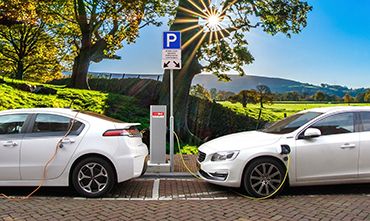A Partnership in Learning by Doing: using research to engage policymakers to pave the way for electric car clubs in Oxfordshire
Dr Hannah Budnitz is a Research Associate in Urban Mobility in the Transport Studies Unit at the University of Oxford. Hannah used an Oxford Policy Engagement Network (OPEN) Seed Fund grant to work with policymakers towards demonstrating the success factors that might support electric car clubs and other electric car sharing models in towns and villages.

In the face of climate change and the urgent need to reduce emissions, the world needs a transformative shift towards sustainable transportation solutions. One of the key drivers of this change is the electrification of vehicles. However, in Oxfordshire, as in many regions, the transition to electric vehicles (EVs) faces a significant roadblock - lack of charging infrastructure.
In 2022, Oxfordshire County Council, in partnership with University researchers, service providers, community groups, and car park operators, worked to install 'park and charge' stations across the county, addressing the charging infrastructure issue head-on. These stations offered residents without off-street parking the opportunity to park for free overnight and charge their electric vehicles at competitive prices.
A Collaborative Approach: Electric Car Clubs and Charging Hubs
Recognizing the potential synergy between EV charging hubs and electric car clubs, the project's partners expanded their collaboration. Leveraging data from surveys, public engagement, and research, a trial was proposed to make sustainable transportation more accessible by offering EV car sharing through car club providers, making use of the ‘park and charge’ stations.
Annual membership surveys show that shared EVs could reduce car travel and offer an alternative to car ownership. The partners believe that the scaling up of various car-sharing models, particularly where public transport is less viable in the rural districts around Oxford City, can meet a broader range of policy objectives, from zero-carbon targets to social inclusion concerns. One of the aims of the project is to show that car clubs – especially those providing EVs - are commercially viable in more rural locations and as such can help achieve both transport and social inclusion policy goals.
I applied for an OPEN Seed Fund to work with current partners to use an evaluation approach, identify the data necessary, and help make the case for future research and innovation in policy-making related to shared transport and its potential in smaller settlements. Our ultimate goal is to demonstrate the 'success factors' of EV car clubs or other EV-sharing models at locations like public charging hubs in smaller towns and villages, and their potential to reduce car ownership and use in more car-dependent communities. By focusing on such places, this approach not only takes a novel perspective, but also looks at ways in which both the switch to EVs and the scaling up of various car-sharing models can meet a broader range of policy objectives, from zero-carbon targets to social inclusion concerns.
Research and Expansion
A follow-up, research-led project, slated for spring 2024, aims to answer critical policy questions, such as the frequency of bookings and the number of unique users compared to city car clubs. Additionally, it will explore whether the duration of rentals is higher, as data suggests in areas with lower population density and higher vehicle ownership. The trial's success will determine whether these electric car clubs are viable in Oxfordshire’s market towns and villages and whether they achieve other policy goals.
The collaboration is not just about immediate results but also about creating an evaluation approach and expanding networks of potential partners. The ultimate goal is to showcase the success factors of EV car clubs and other EV-sharing models at public charging hubs in towns and villages. This initiative aligns with broader policy objectives, from achieving zero-carbon targets to addressing social inclusion concerns.
As the trial continues, we are learning by doing, striving to make EVs more accessible, and transforming the way we think about transportation.